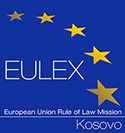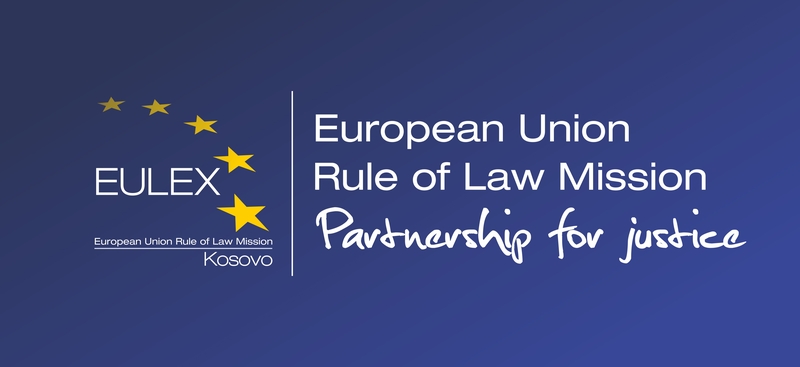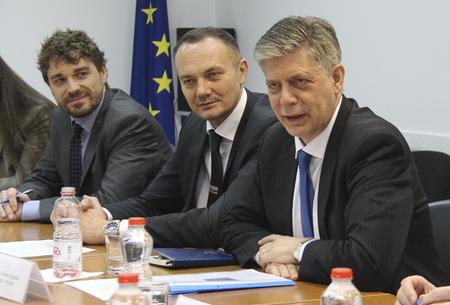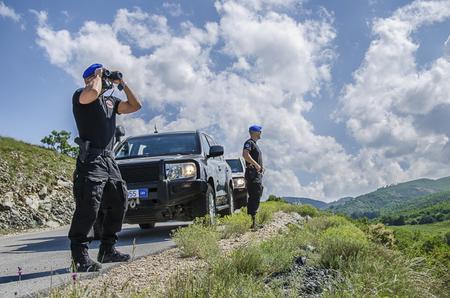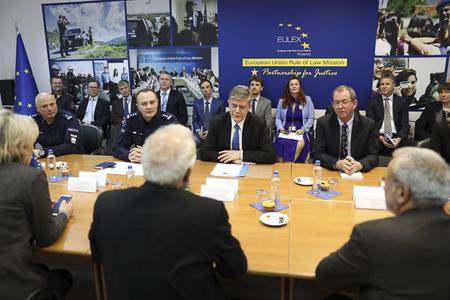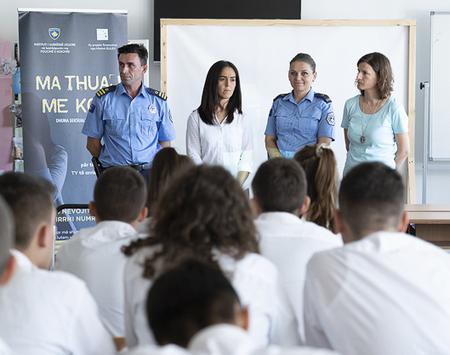On 18 August 2020, Kosovo 2.0 published a One-on-One interview with EULEX Head of Mission, Lars-Gunnar Wigemark. In this extensive interview, Wigemark talks about the Mission's work today, long-lasting professional relationships with the local counterparts and how the future is ultimately in the hands of the people.
Lars-Gunnar Wigemark: The future is ultimately in the hands of the people
New EULEX head talks about the mission today, a new vision and colonialism.
Lars-Gunnar Wigemark, a Harvard
educated Swedish diplomat, was a journalist back in the 1980s before
deciding to go down the diplomatic route. In January this year, he took
over as head of the European Union Rule of Law mission (EULEX).
Despite EULEX having been in Kosovo
for more than a decade, many citizens still know relatively little about
the largest international agency in the country, and at various points
it has been accused of lacking transparency and accountability.
It’s mandate was extended for a further year in June, but because of the pandemic there weren’t the usual
consultations or negotiations as to the terms. Instead, it was extended
on the pre-existing terms by an exchange of letters between the EU’s
minister for foreign affairs, Josep Borrell, and Kosovo’s president,
Hashim Thaçi.
Ahead of the extension, the President’s Office had suggested that EULEX was no longer required and raised questions about the nature of the mandate and the extent of EULEX’s powers.
Now, EULEX works largely as a monitoring mission.
EULEX had an executive mandate
during its first decade in Kosovo, having taken over many rule of law
functions from the United Nations Mission in Kosovo (UNMIK) in 2008. At
its height it had more than 3,000 staff and extensive judicial powers,
but it has changed significantly over the years. It now employs just
over 450 people (it’s authorized to have 503 staff members), and it no
longer has judges or prosecutors after concluding the handover of case files to Kosovo authorities in December 2018.
Now, it has been significantly downsized and works largely as a monitoring mission. However, around 100 Polish police officers are available for security support at the request of Kosovo Police.
EULEX supports Kosovo’s Border Department, the prison system, the
Institute of Forensic Medicine and it monitors selected cases and
trials. It also provides practical support to the Kosovo-Serbia
dialogue, as well as facilitating the exchange of information between
Kosovo’s institutions and INTERPOL, EUROPOL and the Serbian Ministry of
Interior.
According to Wigemark, EULEX’s role is still necessary as “Kosovo still needs an auditor.”
In the eyes of the Swede, Kosovo is not a unique case. He previously worked for four and a half years as head of the EU Delegation to Bosnia and Herzegovina and EU Special Representative to Bosnia and Herzegovina, where, he says, many of the same problems exist.
He also worked at the Swedish Embassy
in Belgrade in the early ’90s, giving him the opportunity to visit
Kosovo in 1992, an experience which gives him a rare outside perspective
on Kosovo then and now.
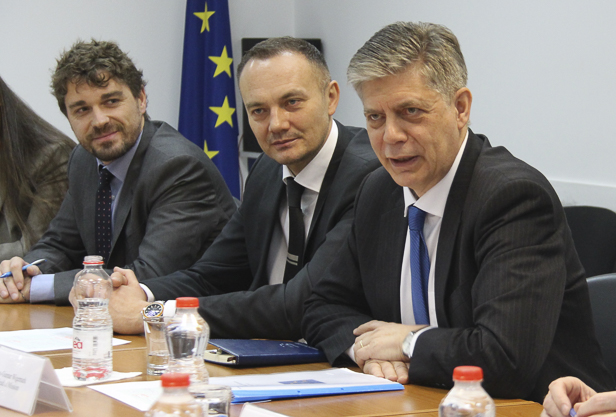
Photo courtesy of EULEX.
We spoke to Wigemark in March,
shortly after the pandemic reached Kosovo and at a time when he had only
been in office for a few months, and then followed up in July. In this
combination of both interviews, Wigemark discusses what EULEX is today,
his vision for the mission and the perception in some quarters that it
is part of the colonization of Kosovo.
K2.0: You know this region well because you previously spent time in Bosnia and Herzegovina.
Lars-Gunnar Wigemark: Yes, I
was there for four and a half years and I thought that was the most
interesting work I had. Now I’m in Kosovo and realizing that I do look a
bit at my experience in Bosnia and Herzegovina, but I’m told not to
draw too many parallels between Bosnia and Kosovo.
But I think in terms of rule of law,
and I think in terms of where the place is in terms of EU integration,
there are some similarities. Not just with these two countries but with
other parts of the Western Balkans. And I think [you have] to see all of
this in a regional context, if you look at how to deal with organized
crime or corruption for that matter, or rule of law in general.
We try as the European Union to have a
regional approach. You may know, for instance, war crimes require that
there is a regional approach.
If the different countries that were
part of the former Yugoslavia, do not cooperate on war crimes, you
cannot [prosecute them]. You cannot go to the bottom and cannot
prosecute all criminals, because many of them have left and gone back to
their respective countries — there’s either no jurisdiction or in the
case of Kosovo you can’t try people in absentia.
That may be about to change soon in Kosovo though so courts can try people in absentia…
I think we would welcome a change in
the law. I think this should be higher on the parliament’s agenda to
adjust this in absentia requirement so that is something we would work
on. I think it would be very good for Kosovo and the region as a whole,
and only by working together on this can we deal with impunity for war
crimes.
And as I said, there are other types
of crimes as well. If you wish to tackle organized crime, for instance,
there are clearly a lot of links across the borders.
What I think a lot of people would ask is: Why is EULEX still here? Is it still needed in Kosovo?
Well EULEX I think has changed and
evolved over time, and the purpose was never of course to replace the
judiciary here, or to act independently of the local judiciary or the
local rule of law institutions.
Looking back, I’m sure there are many
things that could and should have been done differently. On the whole, I
think there is a certain legacy in terms of helping to establish and
build the police to become more professional and more independent.
A lot of work was done, I understand.
You really have had a situation here where you built institutions from
the ground up, especially since Kosovo declared itself independent.
And here I think EULEX has played a
very important role. We’re by no means the only actor. There was a lot
of focus [initially] on the prosecutors and judges, perhaps, looking
back in my opinion, a bit too much. It overshadowed the fact that a lot
of work was done to support the police and to build a more professional
police.
You cannot have outsiders coming in and having this sort of colonial approach.
Of course, it doesn’t mean that the
police here is perfect, but it certainly is much better now than it was.
Ten years ago we had to build a customs system from the ground up. And
that now provides some, I think, 60% of the budget to this country; and I
haven’t heard anyone say that you should not have customs and police.
So can these services be improved?
Yes, of course. That is why we’re still working in these areas, we’re
working with the police.
We still have several police monitor
advisors across the country, including in the north. We work in
particular with the police district in the north but also here in
Prishtina and elsewhere, and we work with a whole local chain starting
with the police investigations, covering everything from forensic
techniques to gender issues.
We are now doing a lot of case
monitoring based upon our EULEX experience and the experience we
gathered during the executive mandate. And I personally think this is in
a way a more effective approach. Why? Because we are not making
decisions — there has to be local ownership.
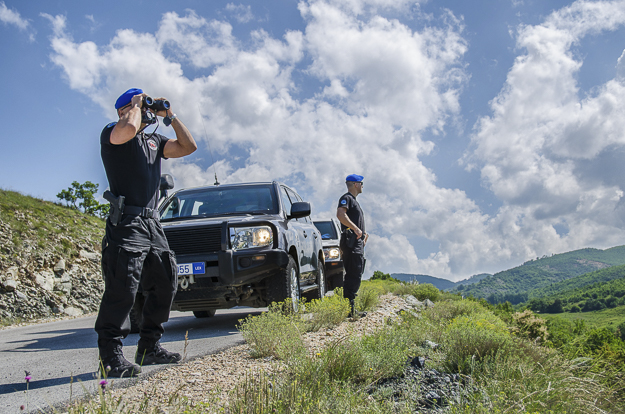
Photo courtesy of EULEX.
I’m firmly convinced of that based
upon my experience from other countries, including here in the region,
but also other countries that have gone through this kind of major
transformation.
Why? Because you cannot import these
things. You cannot have outsiders coming in and having this sort of
colonial approach. I think with the modern rule of law concept and I
think the experience of the European Union shows that also with other
countries that either have already been integrated as members of the
European Union, or are on the path to the EU — and Kosovo is definitely
on the path — still many things need to be done.
Kosovo is only 12 years old. That still makes it a young teenager in terms of its existence.
What was the story with the mandate extension this year? There was
a period before the exchange of letters where EULEX’s mandate briefly expired.
First of all, yes, there was an
exchange of letters agreed by both sides that has now been agreed. Due
to the pandemic both sides agreed to continue business as usual. It’s
basically an extension of the 2018 [two-year mandate] letters for 12 months, because we couldn’t have these more detailed discussions about the exact scope of the activities.
I think the people who say that the
mandate is [solely up to the exchange of] the letters, that’s not
correct. We do consider the mission to have a mandate, going all the way
back to the UN Security Council Resolution 1244 and the fact that we
inherited certain tasks in the area of rule of law — we basically took
over much of the responsibility from UNMIK in 2008. At that time there
was an EU Council decision as well.
Kosovo is the host. We don't like to be here to be imposing on Kosovo.
A series of letters entered into the
picture for the first time in 2012. As I understand, it was
specifically to address the question of the role of EULEX prosecutors
and judges and some questions there that had arisen, and then every two
years, it’s been an exchange of letters. And these have become important
milestones, I think, in the evolution of the mission. Of course, we
prefer to have this exchange of letters with Kosovo.
Why? Because Kosovo is the host. We
don’t like to be here to be imposing on Kosovo, which is why, in 2018,
for instance, this whole executive mandate in the judiciary was phased
out.
And there have been other changes.
We’re now more in this monitoring, mentoring role. As far as the
judiciary is concerned, we have maintained some of the tasks, but it is a
transition. There was a transition already.
We want to be here as long as we can
be useful and things that can be handled by the Kosovo authorities
should be handled by Kosovo.
There were some comments from President Thaçi’s office that Kosovo no longer needs EULEX.
As I recall, toward the end of June,
when this discussion about the exchange of letters was still going on,
his office made some comments that were reflected in the media
concerning the mandate.
Well, the mandate isn’t just
[automatically] expected. And I think that’s something that has led to a
lot of confusion. We try to sort that out, to clarify, without in any
way disparaging the exchange of letters because we would like that [the
exchange of letters].
Although, it took a bit longer than
we had expected. But there were a lot of things in between [around] the
end of May. You had a quite serious situation here in Kosovo, many
questions about the change of government; there was a Constitutional
Court decision that finally sorted that out. There was a new government
that came in, we’ve had the whole COVID pandemic going on.
There are literally hundreds if not thousands of cases out there affected by this.
And of course, we continued working
during this period. We’ve actually remained quite operational throughout
this [pandemic] period. I’m very proud of that. That we were able to
continue working. Of course, we took all the precautionary measures we
could. But our foreign police unit has been here.
We continued monitoring the
judiciary, although there were so many postponed court hearings, but we
still stayed in touch with the judiciary. We expressed our concern with
the fact that there is this loophole in the Criminal Procedure Code,
which means that if there’s no hearing held in a criminal court case
during three months the whole process may have to restart.
We raised that already in April, with
the Kosovo Judicial Council. I hope this loophole can be filled in with
the new version of the Criminal Procedure Code. And we’re now
monitoring this very carefully. And it really now depends on — in each
case — what the parties [and] the judge can agree on. But it would be a
great loss for efficiency.
And it’s not just the cases that we
are monitoring. There are literally hundreds if not thousands of cases
out there affected by this.
Your budget has been decreased by 9% this year. How do you feel about that?
I think this was done in close
coordination with us — the EU requested a budget from us. We are making
some reductions in terms of our staffing, in particular international
staff. So, not too many of our local Kosovo staff will lose their jobs.
And we do that in order to become
more efficient, because this has been and still is a large mission. And
we simply decided to look at this very carefully. We started an overview
or review of the mission’s activities, believing that there would be a
full scale discussion this spring, which was, as I said, put on hold
because of the pandemic.
But in that process we nevertheless
realized that there were some savings we’d have to make. We can’t
justify [maintaining the same budget] — and I’m not going to be a civil
servant or a bureaucrat who always tries to say, “I want more and more
and more.”
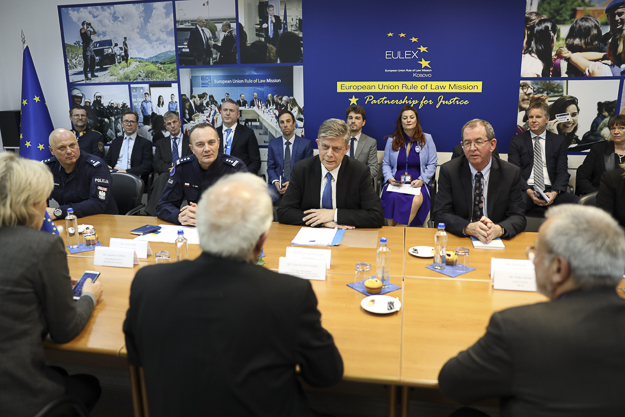
Photo courtesy of EULEX.
Everybody has to evaluate all this
money that’s being spent; now, all governments, everywhere in Europe and
in the world — budgets will be very, very tight. Budgets are already
way over and governments are trying to raise funds. There will be less, I
think, for everyone.
So we’re all going to have to look
for savings, and in that climate, to say, “No, no, no, no, we have to
keep exactly the same… or maybe we even need a little bit more” [would
be wrong].
I know other international
organizations where people just hold on to whatever they have. I think
that’s wrong. We have to justify our existence here also in terms of
what EU taxpayers are getting out of this mission.
Is there strong support for this mission in Brussels?
I would say stronger than ever. It
was very clear, we had a good discussion. I can truly say that it was
quite impressive to see how our member states — all 27— were very
supportive of the mission.
I want to go back to something you touched on earlier, and it’s
something that I’ve not heard from many diplomats or people coming to
work here, and that is about EULEX being seen as colonialists or
committing colonial actions.
You know, we live in a very different world in a global world. We cannot close down our borders and hide behind high walls.
It’s a different kind of democracy. I
think we are trying to come to terms with technology and development of
people is very different from my own generation and young people in
Kosovo. I’m very impressed, by the way, just having been here a few
months and having been here in August 1992.
Kosovo was, in a way, a colony of
sorts, within the former Yugoslavia. And I don’t think anybody wants to
see this repeated. So when EULEX was first established — I think it
first became operational in 2009 — in hindsight it probably would have
been better from the very beginning to work in terms of joint
investigation teams with the local judiciary here and joint trial
panels.
What we can do is support it. But we cannot play the executive role.
That should have happened from the
beginning, not just from 2014 when the whole mandate was modified and
reconfigured. That was the result of that, but from the first almost
five years there was kind of a parallel structure established. I don’t
think that was the intent really. But this is what happened, to try to
describe it in more concrete terms.
But when I say we should not have a
colonial approach, this is a process that every society has to go
through, and you can’t have people in Kosovo expecting that someone from
the outside will come and take care of business here or take care of
ensuring that there is rule of law. What we can do is support it. And as
the European Union, that’s what we do. But we cannot play the executive
role.
I think we tried to do that here in
Kosovo with some limited success but with failures and the expectations
were far too high, and I don’t think they were managed enough. Not
enough transparency of what the mission could do at the time and what
the mandate was at the time.
It was never a full mandate where
EULEX had its own courts that would effectively replace the local
courts. But there was this kind of parallel system for the first several
years, but then based upon that experience there were these joint
panels and joint investigations.
Now we have moved into another phase
from 2018 where we are no longer adjudicating but we are advising,
monitoring and mentoring and these are not just words. I would be happy
to arrange for you and some of your colleagues to meet and listen to
some of our case monitors sometime.
They can explain much better than me,
a relative newcomer. I’m not an expert myself but they can probably
tell you in much more detail why it’s still difficult to have fair and
equitable trials in Kosovo. Why are there still issues and again some of
those issues are not unique to Kosovo.
I see a lot of parallels across the
region. So this exceptionalism is something I don’t accept and I always
said in Bosnia and Herzegovina, let’s not leave this country as sui generis.
Yes, every place is unique, it has its own roots and so on, but it has a
lot of parallels. You have to look for those parallels and try to
adjust whatever support we can provide accordingly.
Regarding the police, there is generally a relatively high opinion of them in Kosovo. But there have been issues, and we have seen some
high profile ones in recent times. How can they be improved?
Particularly on gender-based issues?
We are doing things like our campaign
“Speak Up On Time” where we have used colleagues from member states and
who have experience in forensic investigation and forensic methods, to
explain to young people in schools who may have been subject to sexual
violence the importance of preserving evidence when they are being
physically violated.
This is a difficult, sensitive topic.
But I am very proud that we have such a program that was an initiative
by my colleagues here in the mission, based upon their experience
knowing some of the taboos involved, and we are working with some of the
overall context of awareness raising in general.
What are the issues if you pursue
legal measures to deal with sexually based violence and crimes? I think
we have come up with a number of conclusions and recommendations. I
attended a couple of hours of training myself where we had two of our
police officers, one woman from Germany and a man from Austria, who
trained and shared their experience that is not that different from what
happens in Kosovo.
You have domestic-based violence
everywhere in the world and it’s something you can never get rid of, so
it’s how you deal with it, so when a police officer arrives at the scene
of crime and there is violence and someone knocks on the door.
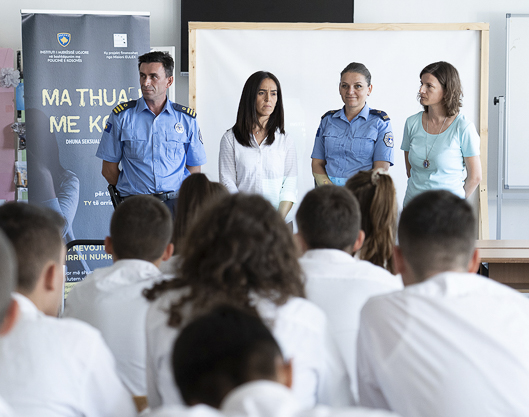
Photo courtesy of EULEX.
What do you do, how do you handle
that concretely? I sat in on this [training] myself for a couple of
hours. I hadn’t planned on it but rather than giving a nice speech and
then walking away [I tried] to actually understand what our police
officers are trying to share with the Kosovo Police.
I also believe that in our next
monitoring report that we would like to make public there will be a
section on gender-based violence cases where we will highlight some of
the experiences and some of the observations that our monitors and
observers have identified.
EULEX has been here for more than 10 years training police. With
Kosovo’s small size, how do the rural areas affect reporting,
particularly on gender issues?
We have worked together with the FBI
in the past. EULEX and FBI investigators worked with Kosovo Police to
train on interviewing domestic violence cases, and we have worked with
the UN and UN Women. We have had various trainings for Kosovo
prosecutors looking at war crimes victims who were subject to gender-
and sexual-based violence, etc.
One more point, we have police
monitors that work in mobile teams and they go to local police stations
to assist police there, and this is one of the issues that they are
looking at and they are willing to provide advice on how to tackle
gender-based violence.
You’re right, it’s a little bit like
how to deal with the question of how to deal with corruption in a very
closely knit society where people are not open enough. Although, I have
to say, at least I think here in Prishtina and perhaps in other cities,
there are people ready to speak up about these questions in a way that I
find encouraging.
Your predecessor said there weren’t enough people who were willing
to speak up about corruption here and the justice system needed more
people willing to speak up. Would you agree or disagree with that?
I think political leaders or
religious leaders, and we have people on social media — if they speak up
and can encourage others to have the courage to step forward I think
that will help.
I think you can see, in any country,
issues with corruption. When I was in Bosnia and Herzegovina a couple of
years ago there were big demonstrations in Romania against legislation
against corruption being watered down; literally hundreds of thousands
of people took to the streets and demonstrated peacefully. Whole
families demonstrated peacefully, and then I tweeted something like,
“When will this happen in BiH?”
When people had issues in one of our
member states they could protest peacefully and effectively and they had
the confidence there would be no violence. Why? Because they are now
members of the European Union; they are now part of something bigger
than themselves.
You cannot put it just on the political leaders; it’s for all people to say no to this kind of behavior.
So, no place is free of this. I
think no place is free of corruption. I think the vast majority of
people in Kosovo would like to live where any kind of corruption is the
exception rather than the norm. But most people would be afraid to speak
out and oppose it openly and would rather remain silent except if there
are enough people who stand up and say no. If you have enough
prosecutors who dare to prosecute then again we can see this.
My own country Sweden had to change
all of its procedures on procurement when it joined the EU. So this is
Sweden, a country not known for having corruption, maybe we were not
looking for it, maybe there were loopholes, maybe those loopholes are
now gone. You can never get rid of it completely, you need a good
legislative framework.
I think Kosovo has that to a great
extent. They have the laws and procedures, they have some of the means,
they have an anti-corruption agency and so on, but that’s clearly not
enough. A question of perception, a question of confidence and people
standing up, and this is of course the responsibility of the entire
society. You cannot put it just on the political leaders; it’s for all
people to say no to this kind of behavior, whether it’s small or a major
one involving funds.
Finally, you were here in August 1992. What are your impressions from then and now?
I was working at the Swedish Embassy
in Belgrade. I came as part of the OSCE mission because Sweden was the
so-called Chair in Office of the OSCE. We were to explore if the OSCE
could establish an office here in Prishtina, and there was also going to
be an office in Sandžak and in Vojvodina to look at the overall
situation for people from minorities.
Kosovo Albanians in those days were
minorities in the former Yugoslavia, in the sense that they were not in
the dominant position that they are now in Kosovo where there are other
minorities, including Bosniaks and so on.
We met with various people with civil
society representatives. We also had a meeting with Ibrahim Rugova who
was at the center with the peaceful resistance against the Yugoslav
authorities. What I remember was a city in Prishtina that was very bleak
where people looked oppressed and I think they were oppressed.
I remember meeting Mr. Rugova who was
rather pale and smoked a lot. He had his signature scarf around his
neck. Even so, he had great charisma and spoke with a kind of quiet
conviction, like when I find myself in the presence of someone who has
been oppressed and suffered a lot but has been convinced of his or her
ideas.
Looking at it from that perspective, I
think Kosovo has come a long, long way. It has not been an easy path,
but in my opinion, in 20 years or even 30 years… this seems a long time
in our lifetime but in our history that is a short period of time and
for this whole region we know what happened 20, 25 years ago.
Do we want to see any repetition of
any kind of possibility to have renewed ethnic tensions, religious
tensions in this region? To have the Balkans again be a playground for
major powers to play with?
No, of course not. As the European
Union we don’t want that and I’m personally convinced. And maybe it was
my fate to come back here almost three decades later — I never planned
that by the way. The work for me is a great honor but also a challenge.
The sooner young people are given the possibility to be not just
observers but participants they will be the social and political change
that Kosovo needs.
I’m well aware of the difficulties.
I’m well aware that there are limits to what we can achieve and what we
can do here in Kosovo. I think the direction is essential. The EU
finally, after two years, [recently]
decided to open up accession negotiations with North Macedonia and the
Albanians. This is a historic step and historic moment in time. Yes, it
took a bit of time to get there. I am convinced Kosovo will get there —
the sooner the better.
We all know what steps need to be
taken to have that happen, and once Kosovo is in a position to be
unhindered, unhampered, I see great potential here. I think people are
very hard working and very enterprising. We see how people from Kosovo
are working abroad and they do very well. Also here, I’ve been impressed
by all the entrepreneurship here.
And you have the young population
that speaks English very well. I’m impressed by that. Certainly it
wasn’t and isn’t the case with the older generation, and even with young
people elsewhere in the region it’s not always the case that they can
speak good English. And many of them want to stay here and build a
future for themselves, but for that to happen they have to be inspired.
Young people are always more
impatient and are always asking for more and they should be and are a
force of change in this society.
The sooner they are given the
possibility to be not just observers but participants they will be the
social and political change that Kosovo needs. Just like all the
countries in the region, it’s their future we are talking about. They
will be the ones in 20 or 30 years who will evaluate if the decisions we
take now are the right ones.
I’ve talked a lot about the change in
development, and the role of the outside international community not to
behave like a colonizing power as was done in the past. But one
shouldn’t underestimate the role of people in any society. It is really
ultimately in the hands of the people where they want society and where
they want their future to be.
Link to the interview: https://kosovotwopointzero.com/en/lars-gunnar-wigemark-the-future-is-ultimately-in-the-hands-of-the-people/
